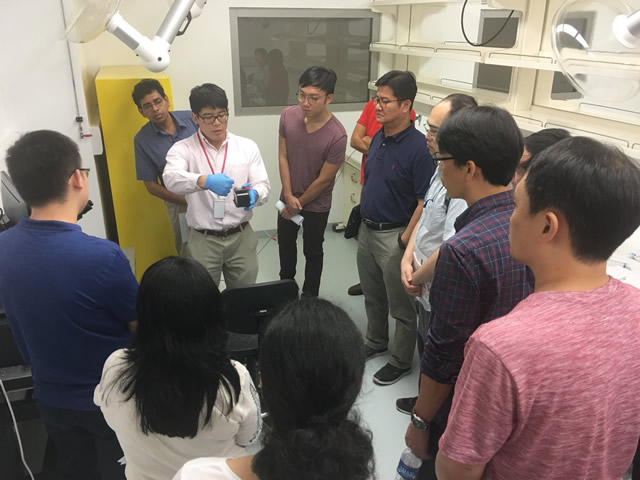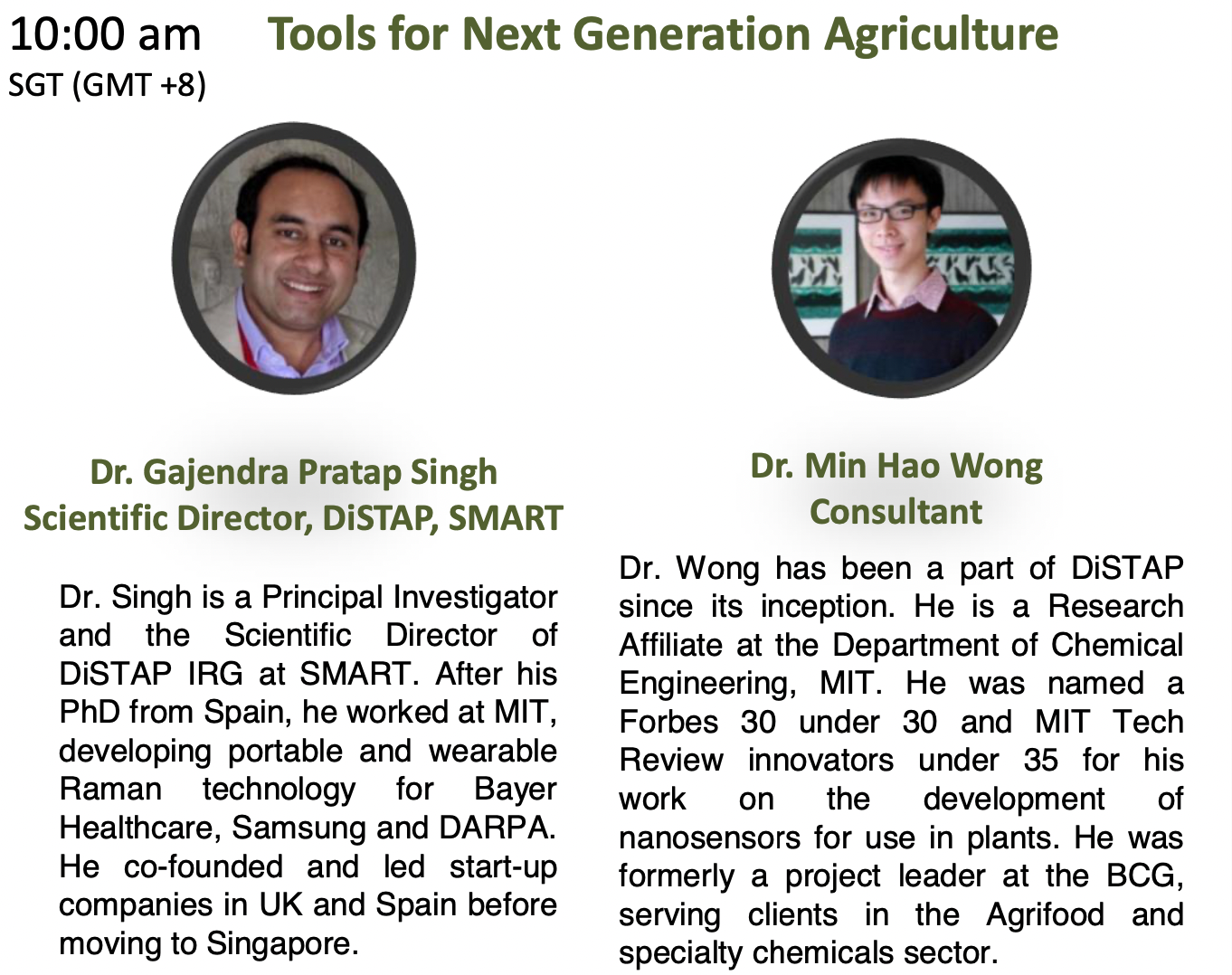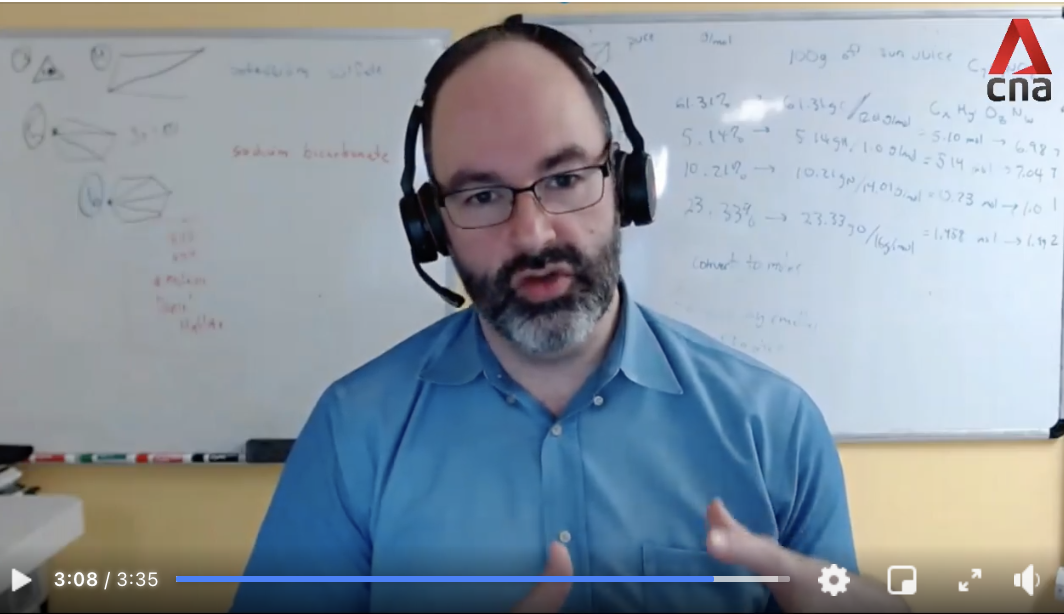News & Events
Tools for Next Generation Agriculture [Link to PDF]. Food demand is expected to increase by more than 90% by 2050. This will shape agricultural markets and our society in ways we have not seen before. It is possible that factors like climate change, rapid urbanization and lack of investment will make it challenging to produce enough food.
Innovative approaches are urgently required to increase productivity and alleviate the growing pressure on agriculture to meet the rising demand for food. This talk highlights the recent development of new analytical tools at DiSTAP that are rapid and non-destructive and provide information on living plants in real time.
Apr 30, 2021 [Click here for more information]
Tech Talk with Daniel Martin, on CNA938 [Link to video]. What innovations are needed to help farmers optimise growth conditions for their crops in order to help us strategise our global food security challenges? Professor Michael S. Strano, Ph.D. Co-Lead Principal Investigator, Disruptive & Sustainable Technologies for Agricultural Precision (DiSTAP), Singapore-MIT Alliance for Research and Technology (SMART), and Professor at Massachusetts Institute of Technology.
Feb 19, 2021
DiSTAP’s research on World Economic Forum’s website [Link to article]. The team at DiSTAP recently developed a portable Raman device that rapidly detects levels of plant stress. The discovery would enable farmers to identify nutrition deficiencies in their crops and can go a long way in tackling food insecurity.
The leading global organisation for public-private cooperation also shared the story on their Facebook and Twitter pages, where they have over 7.9 million and 3.9 million followers respectively.
Jan 11, 2021
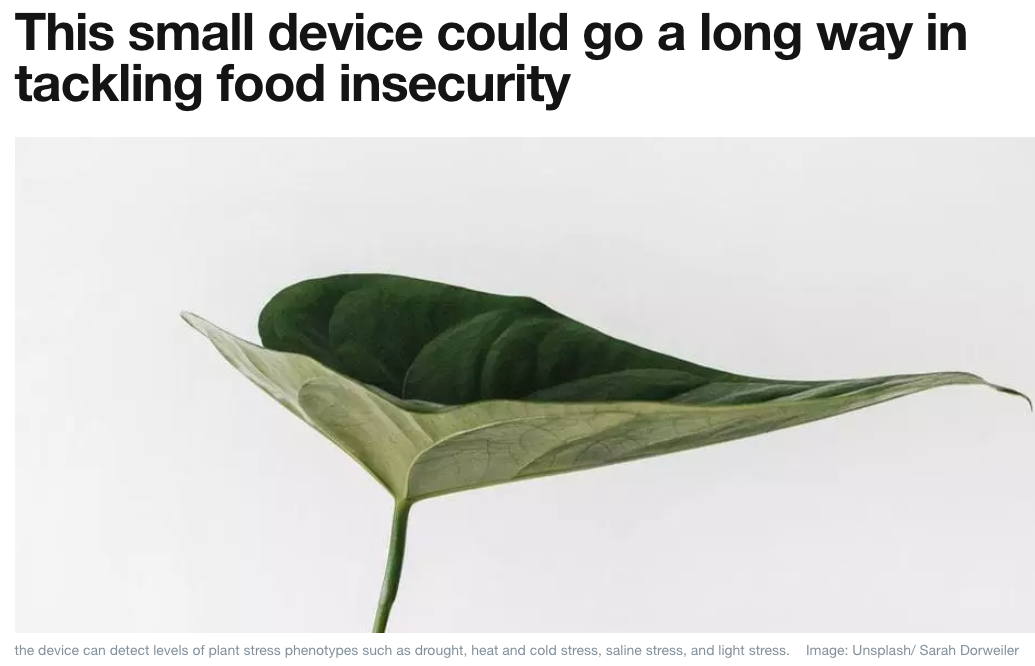
Prof Benedetto Marelli’s interview with Food Pacific Manufacturing [Link to article]. Food waste is a critical problem with roughly a third of the food produced around the world never eaten.
DiSTAP Principal Investigator and MIT Civil and Environmental Engineering Professor Benedetto Marelli has been working on research that aims to tackle this growing problem. He invented technology that can preserve and extend the shelf life of perishable food using silk proteins .
Dec 18, 2020
Silk’s shelf life boost: New food coating tech to begin commercialization journey with high value products [Link to article]
Dec 01, 2020
Indonesians take local approach to massive problem of food waste [Link to article]
Nov 27, 2020
New Discovery by SMART Allows Early Detection of Shade Avoidance Syndrome in Plants [Link to article]
Nov 25, 2020
Singapore-based research group develops two technologies to improve crops’ yield productivity yet for cheaper, nutritious food [Link to article]
Nov 21, 2020
Singapore-based research group develops two technologies to improve crops’ yield productivity yet for cheaper, nutritious food [Link to article]
Nov 21, 2020
Rapid metabolite response in leaf blade and petiole as a marker for shade avoidance syndrome, article published in Plant Methods, gains a ranking among the top 5% of all research outputs ever scored by Altmetric, as well as a high attention score in the 96th percentile compared to outputs of the same age. On top of that, the paper ranked among one of the highest-scoring outputs from the journal Plant Methods, clinching the seventh highlight attention score out of nearly 800 publications.
Oct 27, 2020
Detecting Plant Stress with Nanotechnology – Podcast
June 15, 2020
Digitalization of agriculture can help solve food crisis
Michael Strano – CNBC interview – April 24, 2020
[Read Full Story]
Exclusive: Can urban farming help combat climate change? DiSTAP director says ‘Yes’,
International Business Times, Singapore, August 28, 2019
Singapore is shifting cultivation indoors.
video, TLL and DiSTAP, CNA, 2020
A symposium was held in Singapore – August 15 – 16, 2019
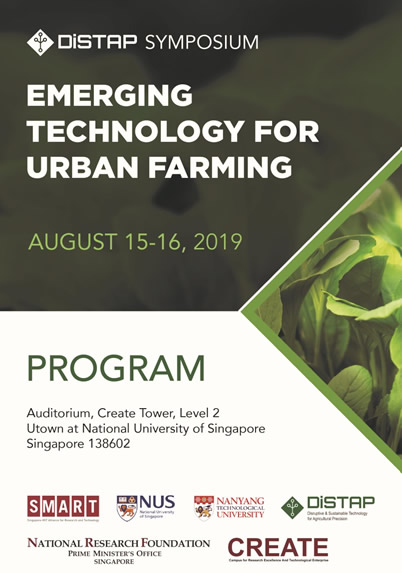
A symposium was held in Singapore – January 14 – 15, 2019
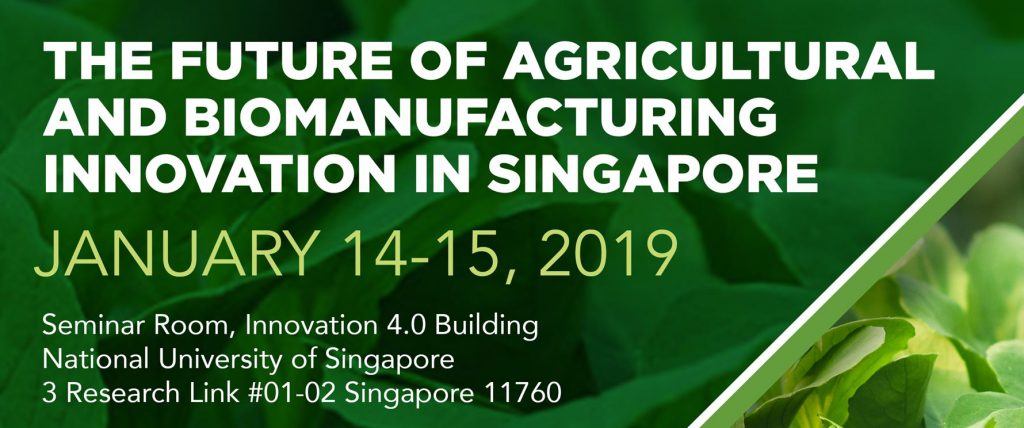
[Details]
New publication:
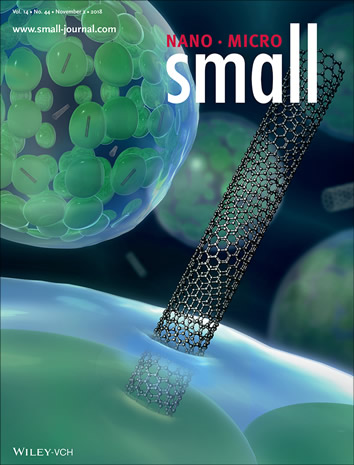
September 4, 2018 – SMART Meet the Community
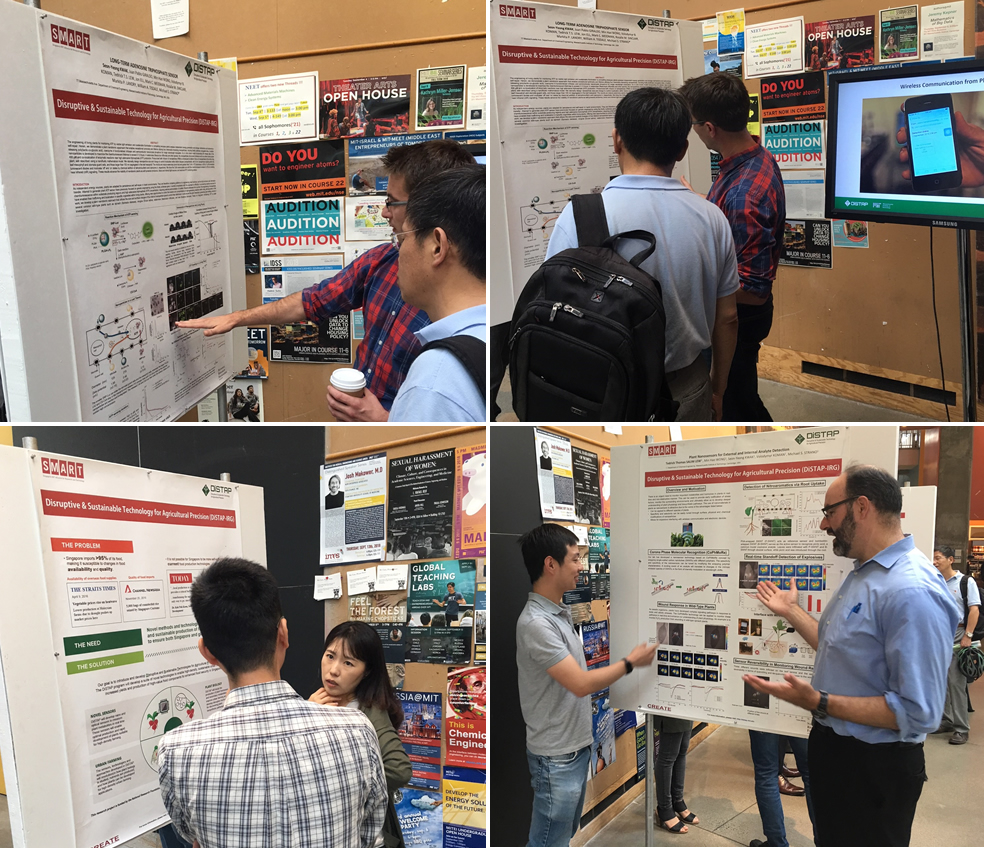
June 12, 2018 – Technology That Matters Series #4
Professor Rajeev Ram shared about DiSTAP’s work with broader members of the community, totalling about 50, including scientists, students, investors and administrators.
Food security is a growing global concern. Singapore, as an island city-state with little to no arable land, is almost completely dependent on other nations to feed its population. Globally, 15% of the world’s 7.4 billion person population currently lacks access to sufficient calories or micronutrients and is malnourished. Professor Rajeev Ram’s seminar, “Deep Tech at the Dinner table”, covered the use of novel methods and technologies for the efficient and sustainable production of foodstuffs to ensure both Singapore’s, and global food security.
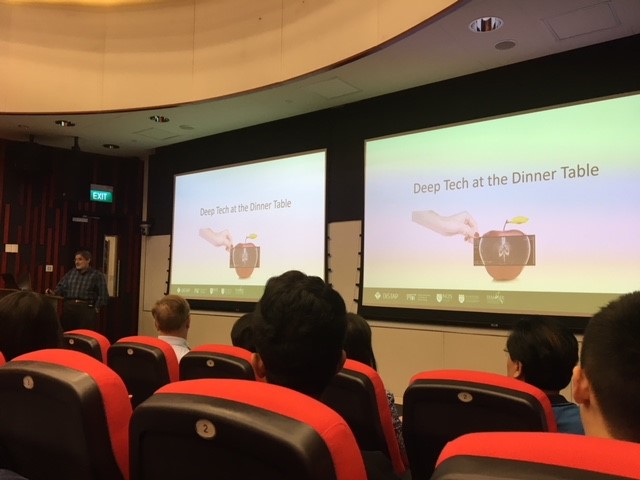
Venue: CREATE Singapore
May 28, 2018 – DiSTAP Training Session for Nanosensor Utilization
DiSTAP held a training session on May 28, 2018, at the CREATE Laboratory to educate and train end-users on how to use plant nanobionic sensors for biochemical monitoring of living plant systems in real-time. More than 15 scientists from the Temasek Life Sciences Laboratory and other collaborator labs attended classroom lectures and laboratory demonstrations that included colloidal nanoparticle sensor characterization, spectroscopic quality, plant infiltration and application, and the use of stand-off spatial/temporal imaging using a novel InGaAs detector setup now operative in the DiSTAP laboratory. Colloidal characterization of such nanosensors is an integral part of their utilization. The training event marks the establishment of facilities within DiSTAP, now online, for fabricating, purifying characterizing, and applying nanosensors to a wide range of plant systems. Current work during the summer of 2018 will examine the spatial and temporal measurement of plant immune signaling in real-time.
